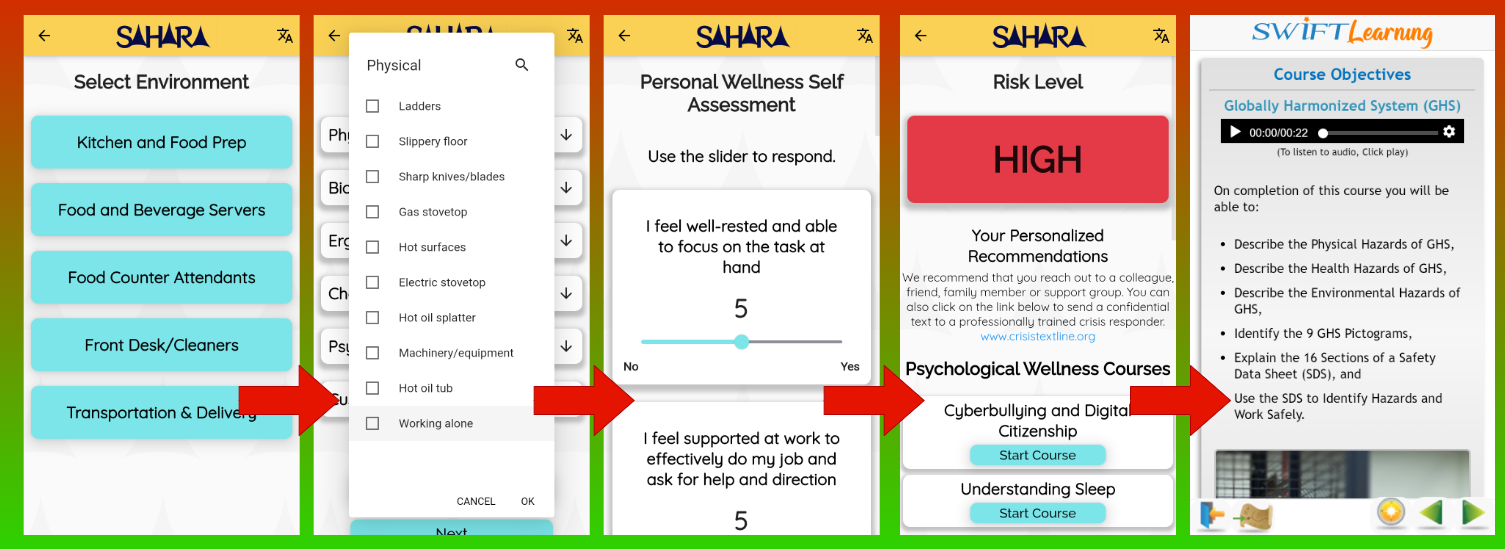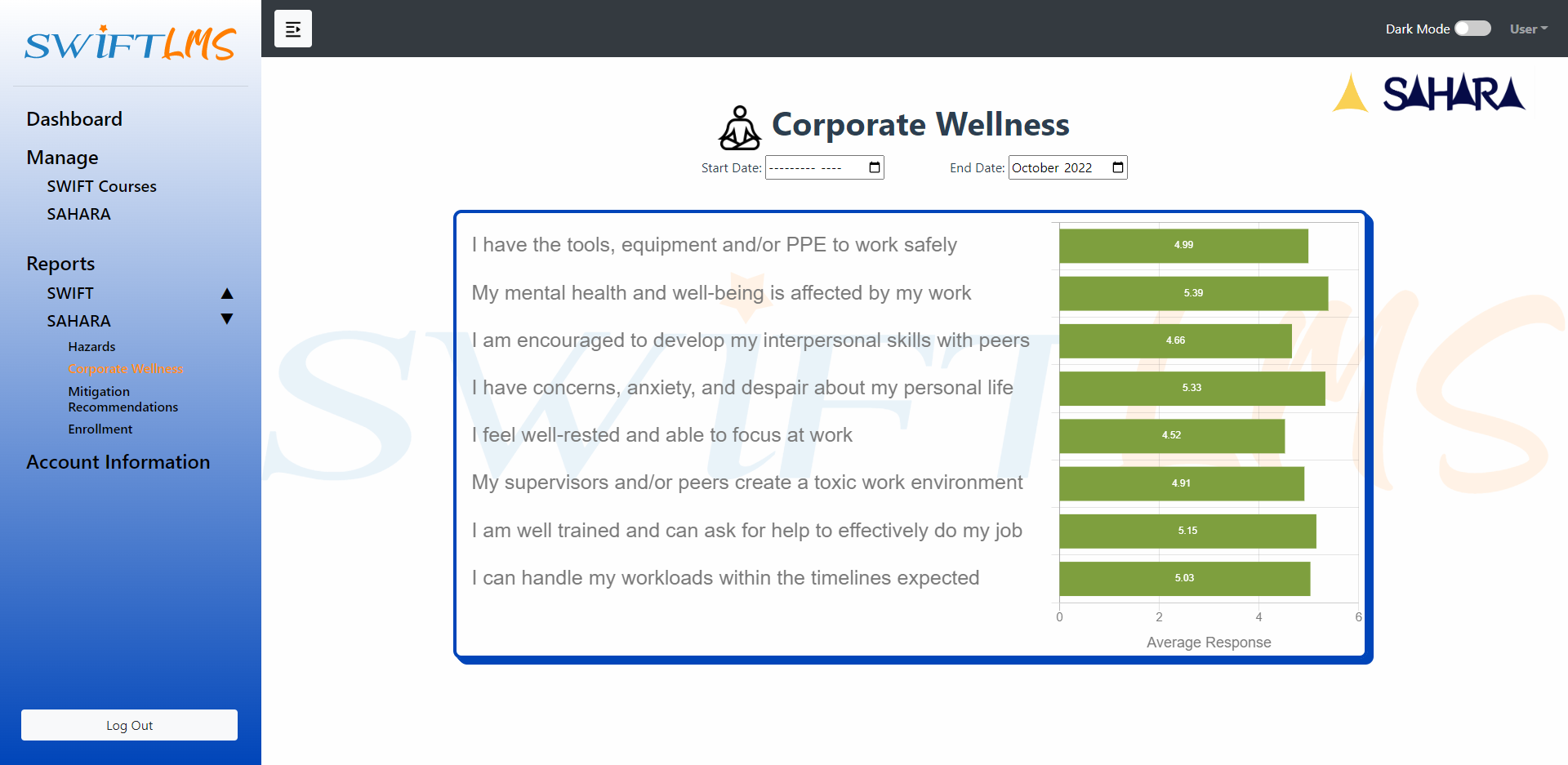
Patent Pending
4
Service Hospitality and Tourism

Associated SWIFT eLearning Courses
- Cold Stress Awareness
- Distractions and Proactive Driver Training
- Driver Hours of Service Limits
- Energy Isolation
- Fall Protection Equipment
- Heat Illness Awareness
- Hydrate Awareness
- Industrial Hygiene Hazards
- Ladder Safety Training
- Mental Health and Well-Being
- Mold Awareness
- Occupational Noise
- Pre-Trip Vehicle Inspection
- Preventing Back and Other Workplace Injuries
- Productivity Diet
- Psychosocial Workplace Safety
- Respiratory Protective Equipment
- SAHARA 4 Service Hospitality and Tourism
- Spill Response and Recovery
- Standard First Aid Overview
- Understanding Sleep
- WHMIS 2015 (GHS)
- Working Alone Safety
- Working in Confined Spaces
- Workplace Harassment and Violence Prevention 4 Employees
- Workplace Inspections
- Workstation Ergonomics
- Your Rights and Responsibilities at Work
SWIFT conducted a focus group with eight organizations in the service hospitality industry and concluded that the process for assessing hazards was completely disjointed, confusing, and frustrating for managers and supervisors, not to mention the employee. A formal process for assessing psychological health was non-existent.
The SAHARA 4 Service Hospitality and Tourism course is delivered free to high schools through the SiS Foundation. The SiS Foundation is a non-profit organization that has been delivering health, safety, environment, mental health and well-being courses since 2011, with more than 150,000 course completion certificates issued to date.
SAHARA ™ (Safety And Health Awareness Risk Assessment) allows organizations of all sizes to cost-effectively meet and exceed the requirements outlined in the CAN/CSA-Z1003-13/BNQ 9700-803/2013 National Standard of Canada .
This Standard specifies requirements for a documented and systematic approach to develop and sustain a psychosocial healthy and safe workplace including a framework to create and continually improve a psychologically healthy and safe workplace specifically:
- the identification and elimination of hazards in the workplace that pose a risk of psychological harm to a worker;
- the assessment and control of the risks in the workplace associated with hazards that cannot be eliminated;
- implementing structures and practices that support and promote psychological health and safety in the workplace; and
- fostering a culture that promotes psychological health and safety in the workplace.

SAHARA educates and empowers workers to recognize potential hazards and how their mental health and mindset directly correlates to increasing their risk of injury in the workplace. The human factors and the hazards identified in the work environment are combined to calculate the Risk Level. The worker’s Risk Level is displayed excluding specific details from their Personal Wellness Self-Assessment.
Anonymity is key to honest responses and eliminating evaluator bias. There may be factors which create an additional hazard the worker does not want to disclose. For example, they may be a driver or operator taking antidepressant medication which is known to cause blurred vision and anxiety, but they do not wish to tell their employer about their medical details.
The Personal Wellness Self-Assessment is confidential and correlates to the worker/employee’s current mental health. Questions related to personal safety, psychological issues, well-being, and right to refuse unsafe work align with emerging standards. Workers that trigger a .
Self-assessed workplace human factors can relate to how the worker is engaged and tasked at the workplace. These may include comfort, confidence, self-assessed ability, training, accident history, peer-pressure, asking for help, pressure to complete work, support etc.
Customizable questions can be specific to the worker at the time of assessment, independent of the workplace and duties e.g., mental fitness-for-work, alertness, sleep, distraction, alcohol or drug impairment components, language, hunger, dehydration, travel time, stress, fatigue, jetlag, shift pattern, anxiety of personal life, despair.
Personalized Recommendations are provided including mobile eLearning courses that directly relate to their job, workplace, selected hazards, and their Personal Self-Assessment. If a High-Risk Level is triggered, workers can access immediate support to an anonymous crisis response support organization and/or Corporate HR representative.
SAHARA is completely digital, accessible from any device, easy to implement and integrate, available in over 100 languages, and highly scalable and cost effective.

 Cart is empty
Cart is empty